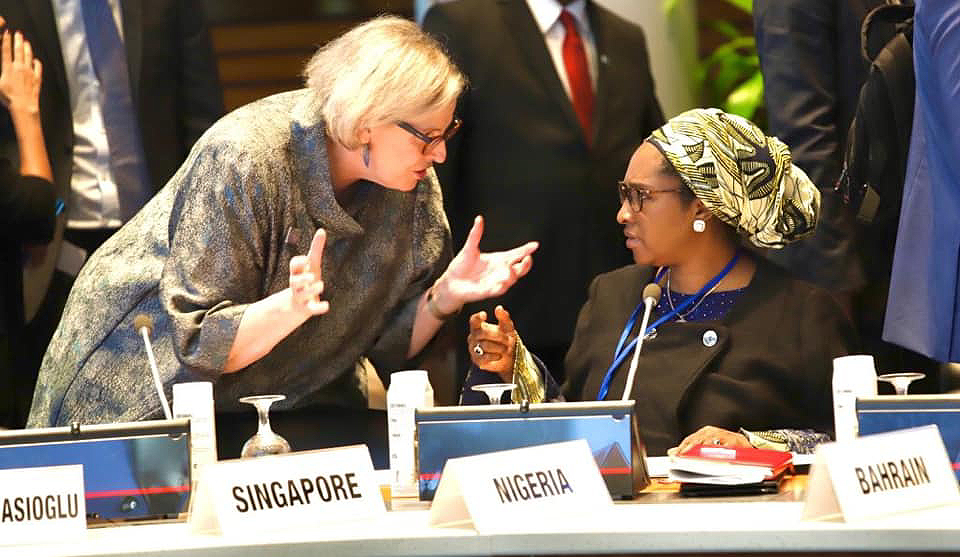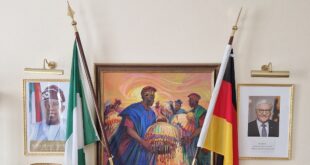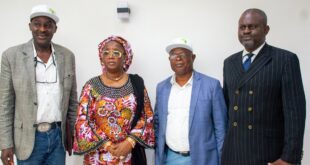Despite economic slowdown, Nigeria still guarantees highest return on investment in Africa, the Minister of Finance, Budget & National Planning, Mrs Zainab Shamsuna Ahmed, has said.
The minister made this disclosure while addressing a special plenary at the just concluded 2019 Annual Meetings of the International Monetary Fund and the World Bank Group in Washington DC, United States.
While speaking at the IMFC Plenary, Mrs. Ahmed, who spoke on behalf of the 23 member countries of the Africa Group I Constituency on the priorities of the continent and how the current global slowdown has impacted the respective economies, observed that in spite of the many socioeconomic challenges assailing many countries of the continent, it is rather heartening to note that the return on investment in most countries of African descent was very encouraging indeed.

Fielding questions from journalists, the minister recalled that she drew the attention of the International community “To our peculiarities of higher interest rates and high returns in the face of global ‘lower for longer rates’ and called on the investing public to consider investing in our constituent countries where returns are high. I urged the Fund to consider proffering country specific policies that will address the issue of high interest rates in our countries.
“For the emerging markets and developing economies, we noted the implications of the slowdown of systemic countries like China, India, Brazil, Turkey on the commodity exporters like Nigerian and South Africa, among others, and we called for strong momentum in structural reforms, well calibrated deployment of fiscal policies to stimulate productivity and the pursuance of tight monetary policies to ensure price stability,” she pressed further at the conference, which took place on 18-20 October.
Citing the World Development Report 2020, an Annual Flagship Report of the World Bank, which report finds that the rise of trade and global value chains (GVCs) accelerated economic growth and poverty reductions in the 1980s and 1990s.
According to her, growth slowed considerably in the aftermath of the financial crisis of 2008. “Also, GVC growth has been concentrated in machinery, electronics, transportation, and in regions specialising in those sectors. Meanwhile, Sub-Saharan Africa (SSA) has played a minor role in the GVCs with participation limited to exports of raw materials and minerals. However, countries in SSAs can still benefit from GVCs by having appropriate policies to attract Foreign Direct Investment (FDI), favourable business climate and investment promotion.

It may be recalled that few years ago, Fitch, the international rating agency, confirmed that Nigeria investment rating was something to cheer about.
Citing the outcome of the report, investors unanimously declared Nigeria 35 per cent rate of return on investment as the global highest even as they called on the Federal Government to pursue an aggressive positive image campaign across the globe in its efforts to attract FDI.
Besides, they impressed on the government the need to fast track tax reform in other to ensure continuity of the economic reform process.
Fitch gave the country a sovereign rating of BB- thus bringing the country to the same investment scale with such countries like Brazil, Iran, Vietnam, Turkey and some others.
According to Mr David Cowan, Senior Economist of the Economist Intelligence Unit, potential rewards for investors do remain high, but the government needs to pick up the pace to ensure that the course for reform becomes effective.
With this sovereign rating, the first ever in the history of the country, Nigeria is now at par with developing economies like Brazil, Venezuela, Iran, Turkey, Ukraine and Vietnam.
According to the statement issued by Fitch, “Nigeria’s ratings are underpinned by the current government’s strong commitment to economic reform, including measures to improve governance, tackle corruption, accelerate privatisation and rationalise the banking system.”
Tope Ademiluyi
 THE AFRICAN COURIER. Reporting Africa and its Diaspora! The African Courier is an international magazine published in Germany to report on Africa and the Diaspora African experience. The first issue of the bimonthly magazine appeared on the newsstands on 15 February 1998. The African Courier is a communication forum for European-African political, economic and cultural exchanges, and a voice for Africa in Europe.
THE AFRICAN COURIER. Reporting Africa and its Diaspora! The African Courier is an international magazine published in Germany to report on Africa and the Diaspora African experience. The first issue of the bimonthly magazine appeared on the newsstands on 15 February 1998. The African Courier is a communication forum for European-African political, economic and cultural exchanges, and a voice for Africa in Europe.






















